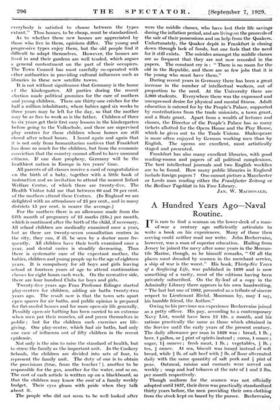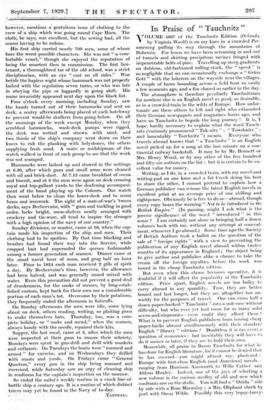A Hundred Years Ago—Naval Routine.
Owing to his previous sea experience Bechervaise joined as a petty officer. His pay, according to a contemporary Navy List, would have been £2 12s. a month, and his rations practically the same as those which obtained in the Service until the early years of the present century. The daily allowance per man in 1.828 was : bread, 1 lb. ; beer, 1 gallon, or J pint of spirits instead ; cocoa, 1 ounce.; sugar, 11 ounces ; fresh meat, 1 lb. ; vegetables, 1 lb. ; tea, 1 ounce. At sea, biscuit was issued instead of soft bread, while I lb. of salt beef with lb. oillour alternated daily with the same quantity of salt pork and f pint of peas. Oatmeal, raisins and currants were served out weekly ; soap and leaf tobacco at the rate of 1 and 2 lbs. per month respectively.
Though uniform for the seamen was not officially adopted until 1857, their dress was practically standardized thirty years before, the men providing their own clothing from the stock kept on board by the purser. Bechervaise, however, mentions a gratuitous issue of clothing to the crew of a ship which was going round Cape Horn. The cloth, he says, was excellent, but the sewing bad, all the seams having to be redone. . . His :first ship carried nearly 700 men, some of whoni bore the worst possible characters. She was not " a com- fortable vessel," though she enjoyed the reputation of being the smartest then in commission. The first lieu- tenant, a thoroughbred tar of the old school, was a strict disciplinarian, with an eye " cast on all sides." Woe betide the hapless wight whose hammock was not properly lashed with the regulation- seven turns, or who was late in obeying the pipe or laggardly in going aloft. His name invariably appeared next day upon the black list. Four o'clock every morning, including Sunday, saw the hands turned out of their hammocks and sent on deck, a sentry afterwards being placed at each hatchway to prevent would-be skulkers from going below. On all the mornings of the week except Monday, when they scrubbed hammocks, wash-deck pumps were rigged, the deck was wetted and strewn with sand, and two thirds of the ship's company went down on their knees to rub the planking with holystones, the others supplying fresh sand. A mate or midshipman of the watch walked in front of each group to see that the work was not stamped. Hammocks were lashed up and stowed in the nettings at 6.30, after which guns and small arms were cleaned with oil and brick-dust. At 7.15 came breakfast of cocoa and biscuit, and at 8 the men were again on deck crossing royal and top-gallant yards to the deafening accompani- ment of the band playing up the Colours. One watch then went below to clean the lower-deck and to scour brass and ironwork. The sight of a man-of-war's 'tween decks, says Bechervaise, with " guns and tackling in good order, locks bright, mess-shelves neatly arranged with crockery and tin-ware, all tend to inspire the stranger with a high opinion of the navy of our country." Sunday divisions, or muster, came at 10, when the cap-- tain made his inspection of the ship and men. Their clothing had to be spotless. By that time blacking and brushes had found their way into the Service, while cropped hair had superseded the queues fashionable among a former generation of seamen. Dinner came at the usual naval hour of noon, and grog half an hour later. Prior to 1824 each man received 2 gills of spirit a day. By Bechervaise's time, however, the allowance had been halved, and was generally issued mixed with water. Even this precaution did not prevent a good deal of drunkenness, for the cooks of messes, by long-estab- lished custom, kept back for their own use a considerable portion of each man's tot. Overcome by their potations, they frequently ended the afternoon in fisticuffs. On Sunday afternoons the men were idle, some lying about on deck, others reading, writing, or plaiting grass to make themselves hats. Thursday, too, was a com- plete holiday, or " make and mend," when the seamen, always handy with the needle, repaired their kits. - Supper, the last meal, came at 5, after which the men were inspected at their guns to ensure their sobriety. Mondays were spent in gun-drill and drill with muskets and cutlasses. On Tuesdays the boats were "manned and armed " for 'exercise, and on Wednesdays they drilled with _masts 1. and yards. On Fridays came " General Quarters," every gun in the ship being manned and exercised, while Saturday saw an orgy of cleaning ship in readiness for the captain's inspection on the morrow. So ended the sailor's weekly routine in a crack line-of- battle ship a century ago. It is a routine of which distinct traces may yet be found in the Navy of to-day.
_TAFFRAIL.

































 Previous page
Previous page